RSF unveils nominees for 2021 Press Freedom Awards
Reporters Without Borders (RSF) is unveiling the nominees for the 2021 RSF Press Freedom Awards, which will be awarded on 18 November. Journalists and media outlets from 11 countries have been nominated for the awards that will be given in three categories – journalistic courage, impact and independence.
The 12 nominees (four in each category) consist of six journalists, four of whom are women, and six media outlets or journalists’ organisations. They include specialists in investigative journalism in countries where the right to inform is drastically curtailed or is under threat – Belarus, China, Brazil, Turkey and Northern Ireland (United Kingdom).
Since 1992, the Reporters Without Borders Press Freedom Awards has encouraged, supported and rewarded the work of journalists and media making a notable contribution to the defence or promotion of freedom of the media around the world. More than 50 men, women, news organisations and NGOs with a shared commitment to press freedom have received this prize.
“The list of nominees for the 2021 Awards reflects the challenges facing journalists and media outlets engaged in a common battle for the freedom to inform,” RSF secretary-general Christophe Deloire said. “These men, women and media outlets fight with courage and determination against converging forces that undermine journalistic independence. Journalists are often threatened, prosecuted or imprisoned in many countries around the world. Media are censored, stigmatised, marginalised, banned or shut down. The RSF Awards is a tribute and above all a support for all those who embody journalism’s ideals.”
Chaired by RSF president Pierre Haski, the jury of the 29th RSF Press Freedom Awards consists of prominent journalists and free speech defenders from all over the world.
The jury members are Rana Ayyub, an Indian journalist and Washington Post opinion columnist; Raphaëlle Bacqué, a leading French reporter for Le Monde; Mazen Darwish, a Syrian lawyer and president of the Syrian Centre for Media and Freedom of Expression; Zaina Erhaim, a Syrian journalist and communication consultant; Erick Kabendera, a Tanzanian investigative reporter; Hamid Mir, a news editor, columnist and writer; Frederik Obermaier, a German investigative journalist with Munich’s Süddeutsche Zeitung newspaper; and Mikhail Zygar, a Russian journalist and founding editor-in-chief of Dozhd, Russia’s only independent TV news channel.
Nominees for the Prize for Courage:
Kay Zon Nway (Myanmar)
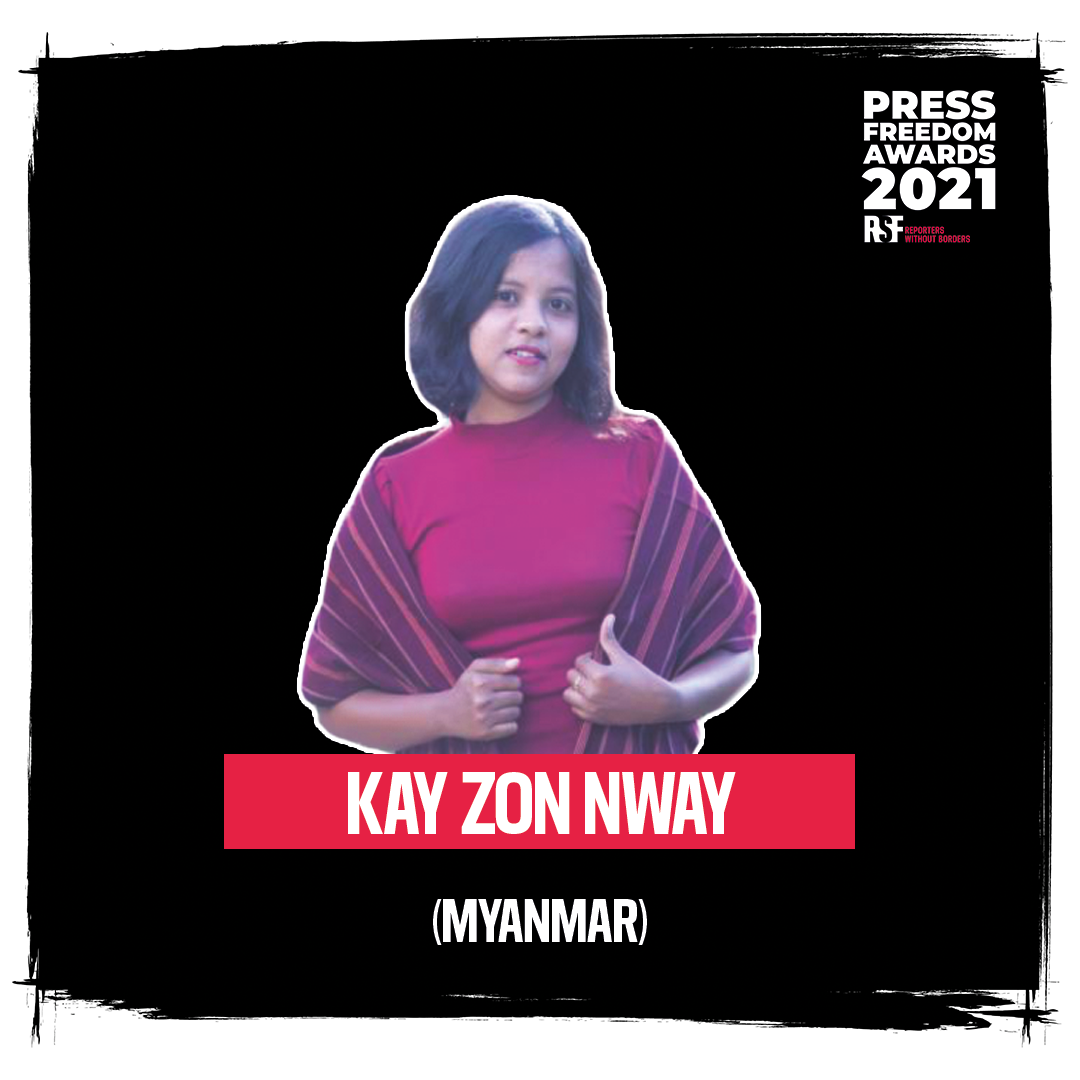
This young but seasoned reporter is a symbol of the courageous fight for the freedom to inform on the ground in Myanmar, a fight that led to her being jailed after she was arrested on 26 February while live-streaming an anti-coup protest. Released on 1 July after 124 days in Myanmar’s grim prison cells, Kay Zon Nway is also the symbol of a generation of reporters that began working during Myanmar’s democratic interlude (from 2011 until the coup d’état in February of this year) and regards submitting to the controls and censorship imposed by the junta as unthinkable. She works for Myanmar Now, a media outlet that has itself played a historic role in the long fight for press freedom in Myanmar
Zhang Zhan (China)
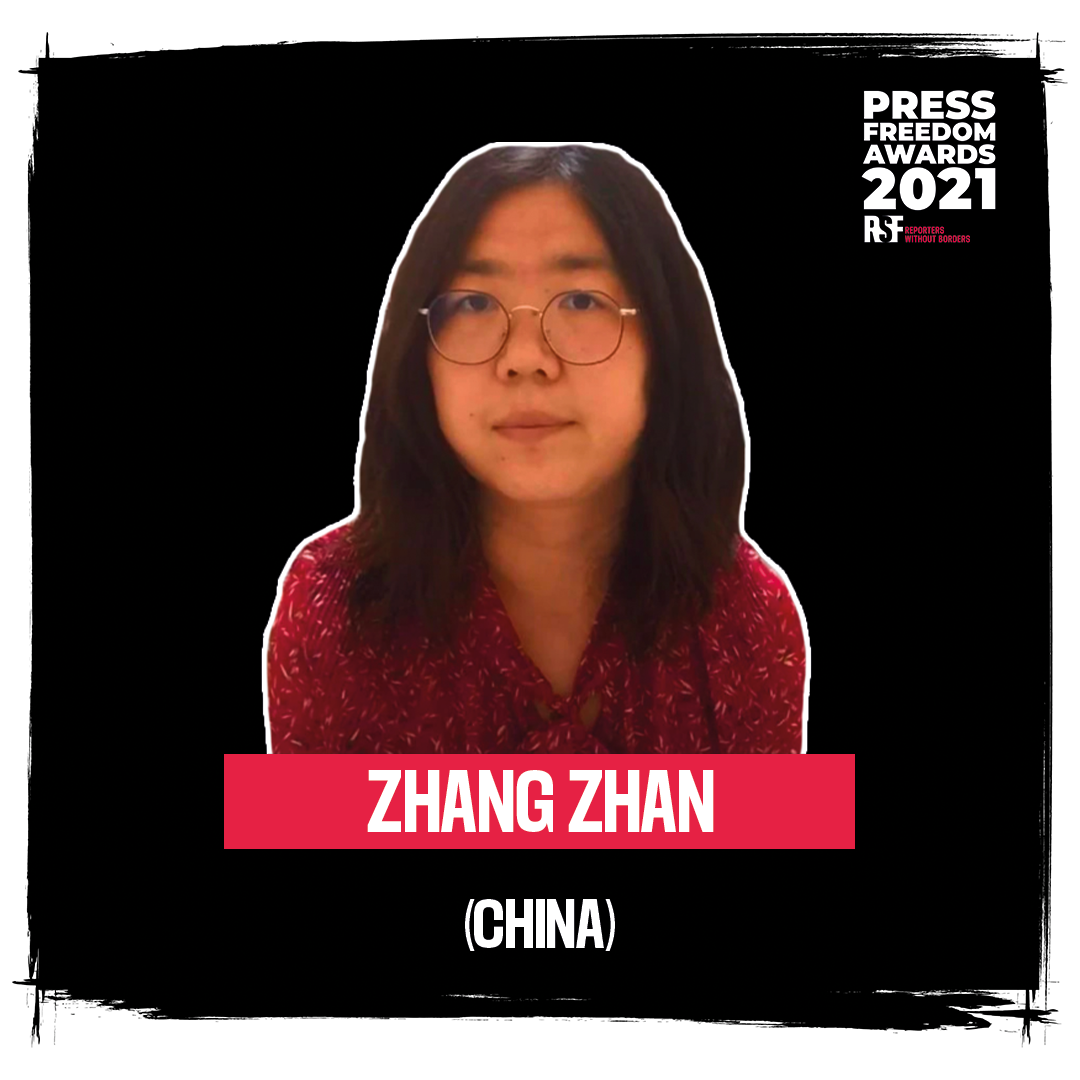
Lawyer turned journalist Zhang Zhan was sentenced in December 2020 to four years in prison for “picking quarrels and provoking trouble” while covering the initial Covid-19 outbreak in the city of Wuhan in February 2020. Despite constant threats from the authorities, she live-streamed video reports on YouTube, WeChat and Twitter, showing the city’s streets and hospitals, and the harassment to which the families of the sick were subjected. Widely shared on social media, her reporting was one of the main sources of independent information about the health situation in Wuhan at the time. Arrested in May 2020, she was held incommunicado for several months without any official reason being provided and, when she went on a hunger strike, she ended up being shackled and force-fed. There is currently a great deal of concern that she could be subjected to further torture and ill-treatment.
Patricia Devlin, Northern Ireland (UK)
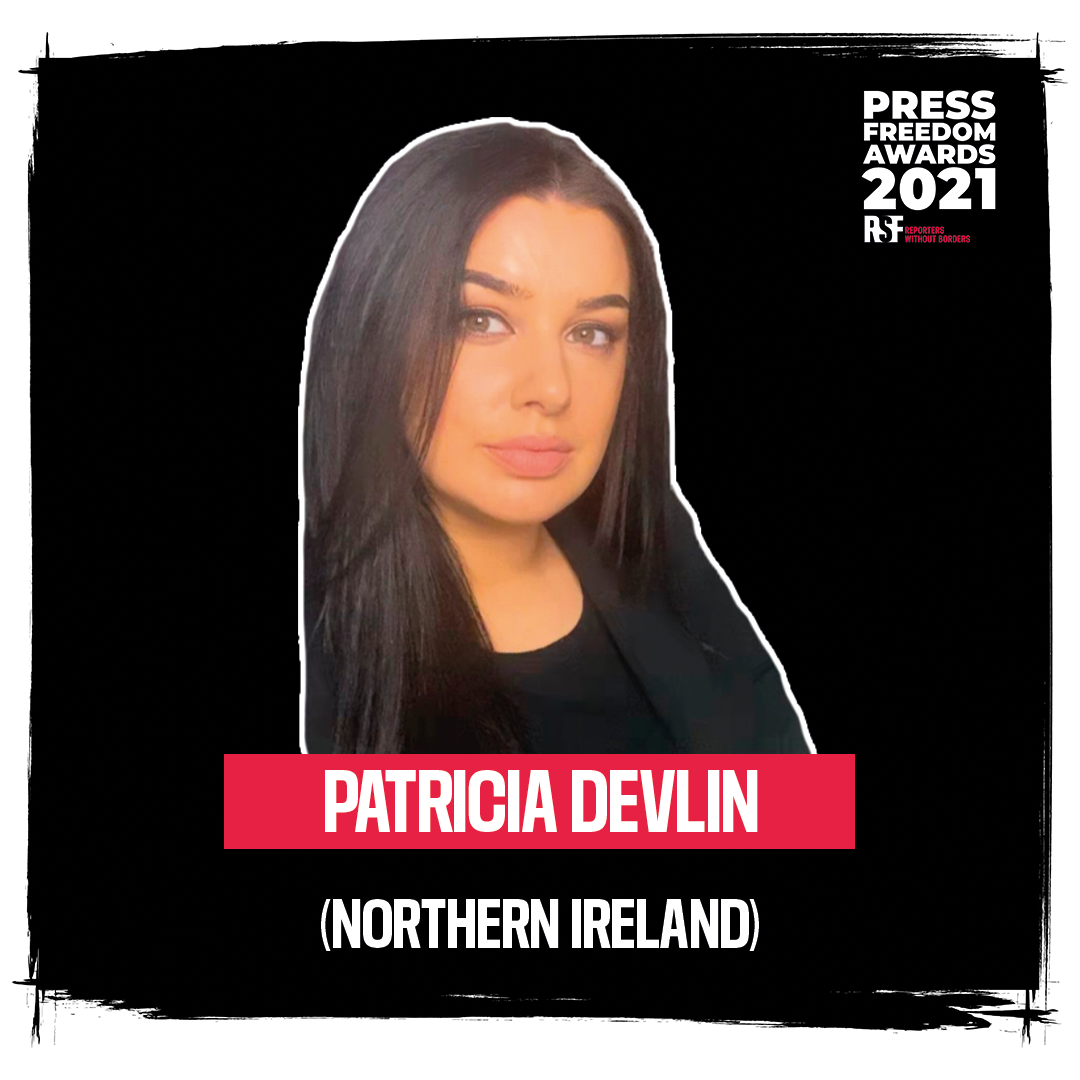
Patricia Devlin is a journalist on the crime beat with the Sunday World, currently based in Belfast but she has worked all over the island of Ireland. She has faced enormous pressure and demonstrated tremendous courage in her reporting on organised crime and paramilitary activities; in speaking out about the gender-based violence she has faced in connection with her work, including horrific threats to herself and her family; and in fighting back by initiating legal action against the Police Service of Northern Ireland (PSNI) for police failure to properly investigate the threats against her, as well as a legal notice against Facebook, seeking the disclosure of the details of an account that made threats of rape against her newborn son.
Confidencial (Nicaragua)
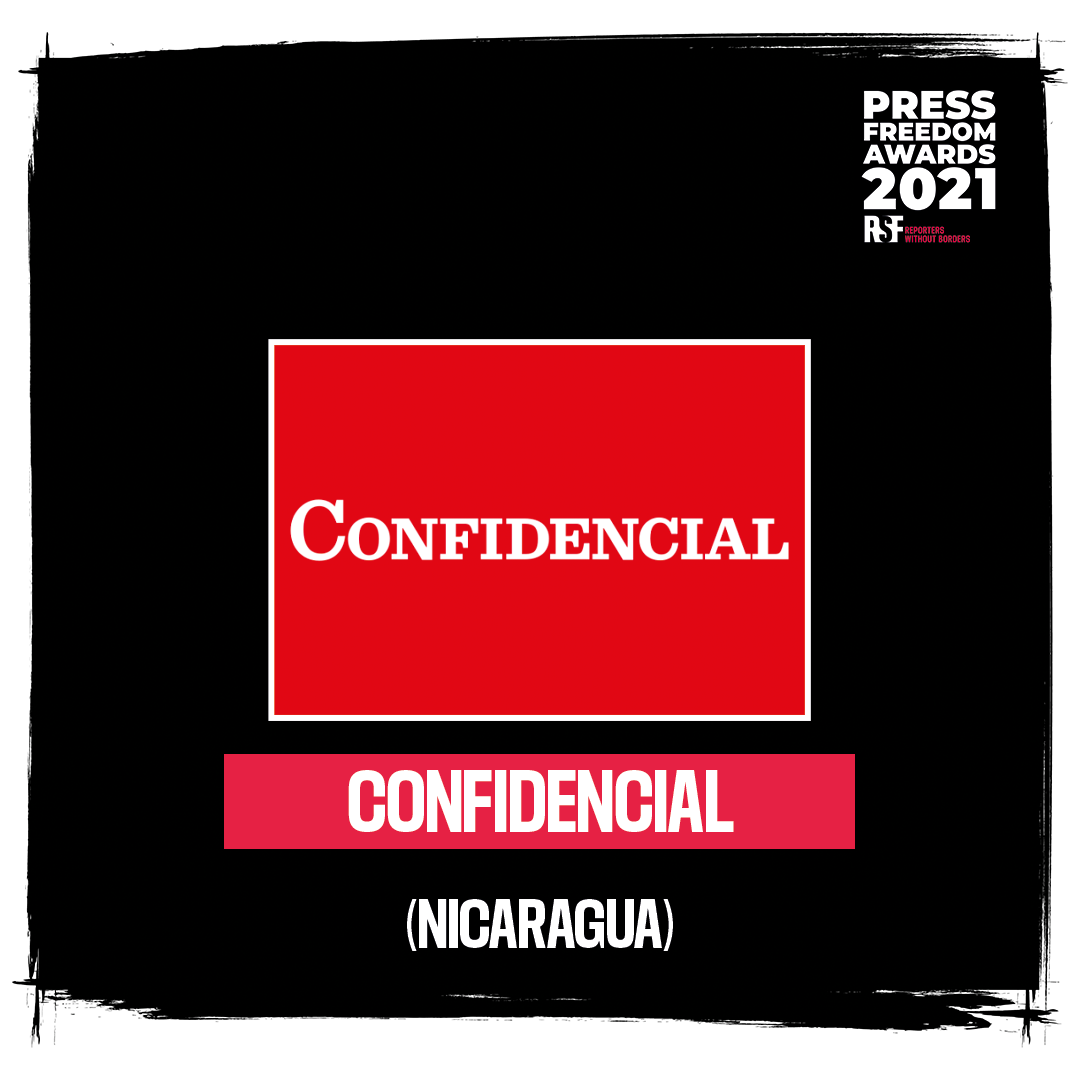
Confidencial is a Nicaraguan weekly newspaper founded in 1996, known for its investigative journalism and one of the few non-official media outlets that remains in the country. On May 20, the government of Daniel Ortega raided the editorial offices, founded by journalist Carlos Fernando Chamorro. It also arrested journalists covering the incident. The police confiscated boxes, computers, and television recording and editing cameras. On Dec. 13, 2018, Confidencial headquarters were raided for the first time by the police without a court order. Censorship and attacks against independent media outlets have been intensifying since 2018.
--
Nominees for the Prize for impact:
Pegasus Project (International)
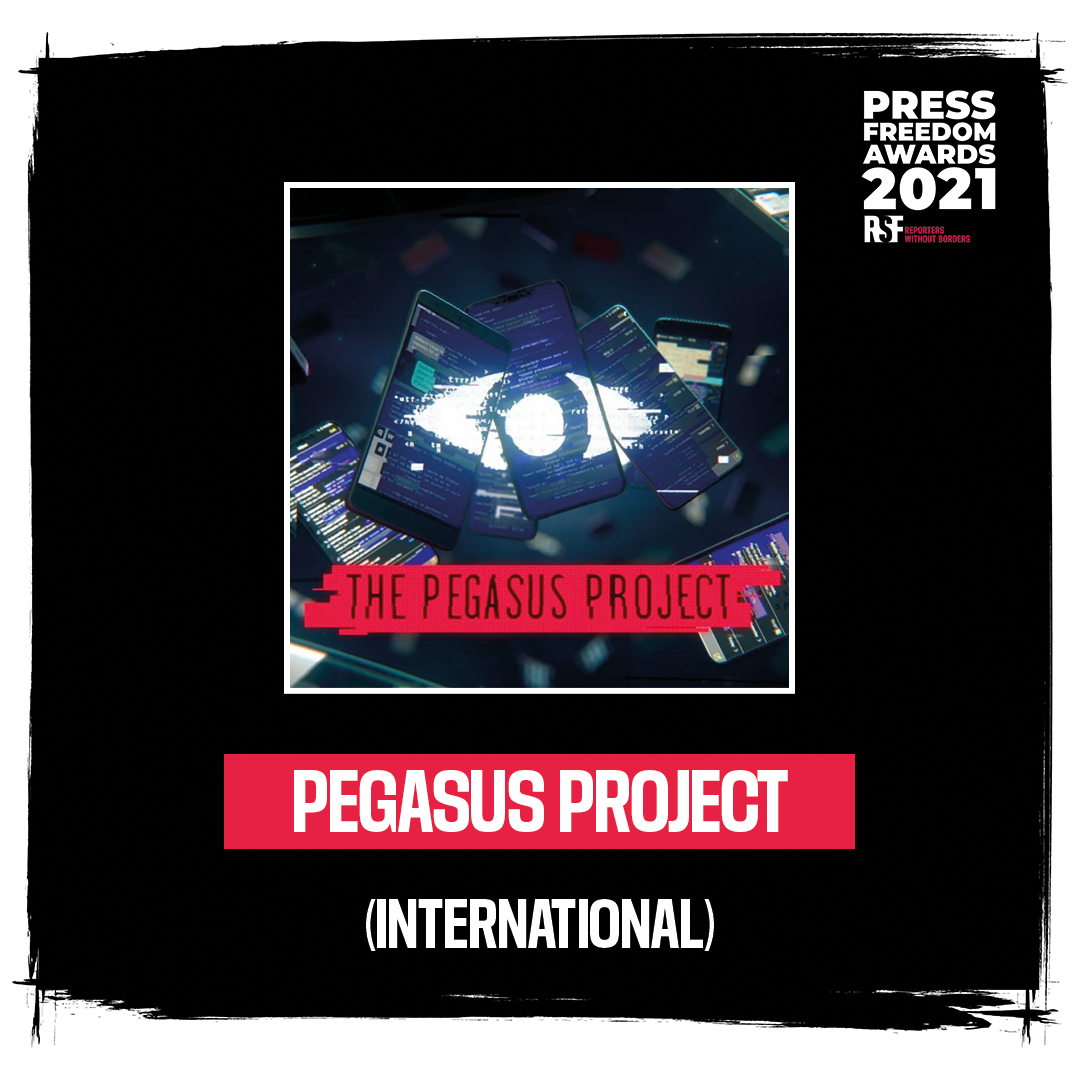
The Pegasus Project is an investigation by an international consortium of more than 80 journalists from 17 media outlets* in 11 different countries that was coordinated by the NGO Forbidden Stories with technical support from experts at Amnesty International’s Security Lab. Based on a leak of more than 50,000 phone numbers targeted by Pegasus, spyware made by the Israeli company NSO Group, the Pegasus Project revealed that nearly 200 journalists were targeted for spying by 11 governments – both autocratic and democratic – which had acquired licences to use Pegasus. This investigation has made people aware of the extent of the surveillance to which journalists are exposed and has led many media outlets and RSF to file complaints and demand a moratorium on surveillance technology sales.
*(Aristegui Noticias, Daraj, Die Zeit, Direkt 36, Knack, Forbidden Stories, Haaretz, Le Monde, Organized Crime and Corruption Reporting Project, Proceso, PBS Frontline, Radio France, Le Soir, Süddeutsche Zeitung, The Guardian, The Washington Post et The Wire)
Belarusian Association of Journalists (BAJ) (Belarus)
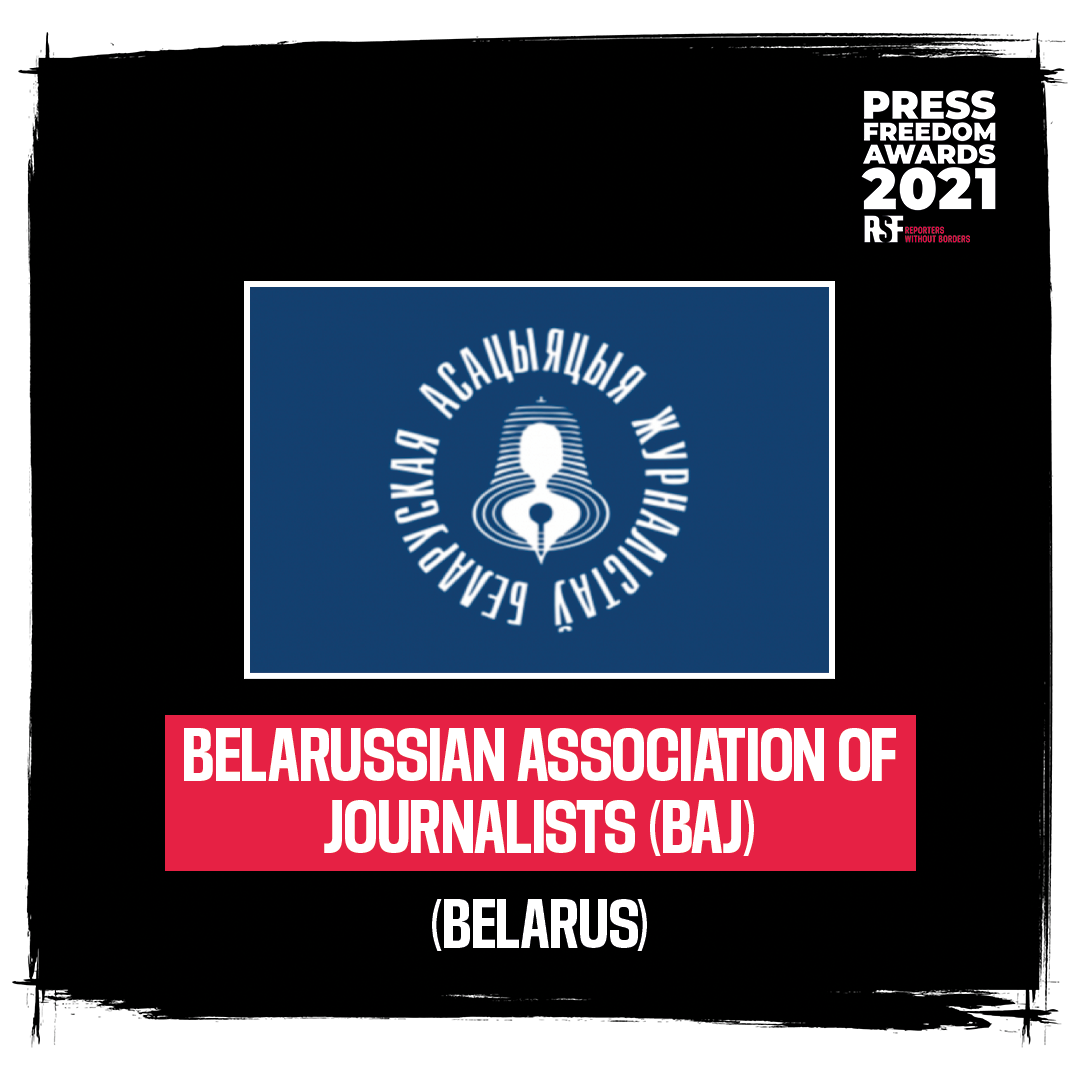
Founded in 1995 to support independent journalism, the Belarusian Association of Journalists has played a pivotal role in documenting the unprecedented level of attacks and arrests targeting journalists in Belarus since the disputed presidential election in August 2020. The BAJ has carefully listed all the forms of persecution of journalists and independent media – including arbitrary searches, censorship, violence and imprisonment – that have intensified steadily for the past year, and it has done this despite being harassed by the authorities. The BAJ’s work has helped alert Belarusian citizens, international NGOs and foreign governments to the gravity of the press freedom situation in Belarus.
Bellingcat (Netherlands)
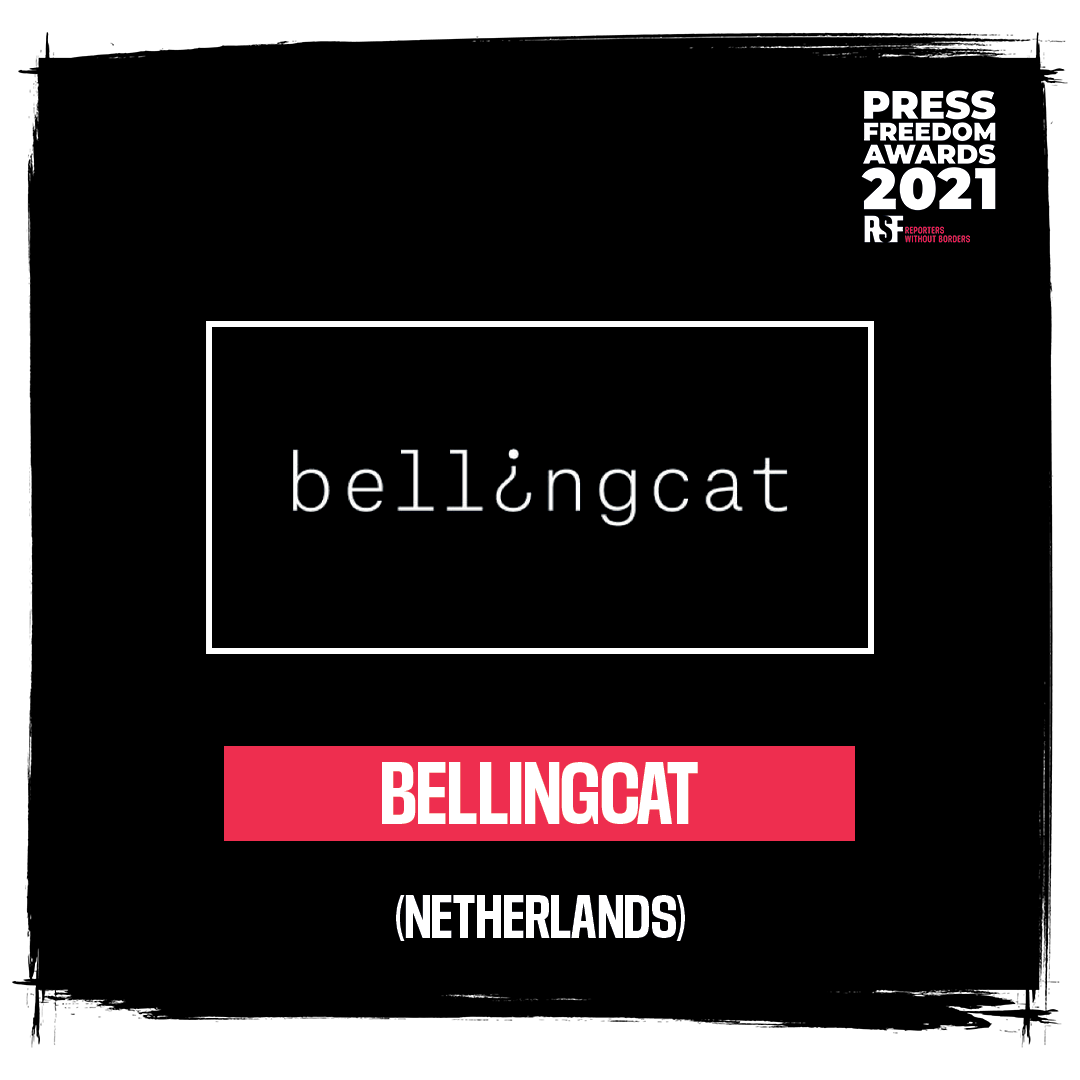
Bellingcat is an independent international collective of researchers, investigators, and citizen journalists publishing on a variety of subjects. With their innovative approaches using publicly available open source data, social media investigation, and citizen journalist analysis, they got significantly advanced reporting on violence against journalists during the nationwide protests which took place last summer in US following the death of unarmed black man George Floyd. Their stories include highly impactful and effective features and visualizations and showed how US law enforcement deliberately targeted journalists at these protests. Last year, together with a team of volunteers, Bellingcat worked with a partner organization to map hundreds of other instances of police violence targeting demonstrators, bystanders, and reporters during the May and June 2020 protests.
The Intercept Brasil (TIB) (Brazil)
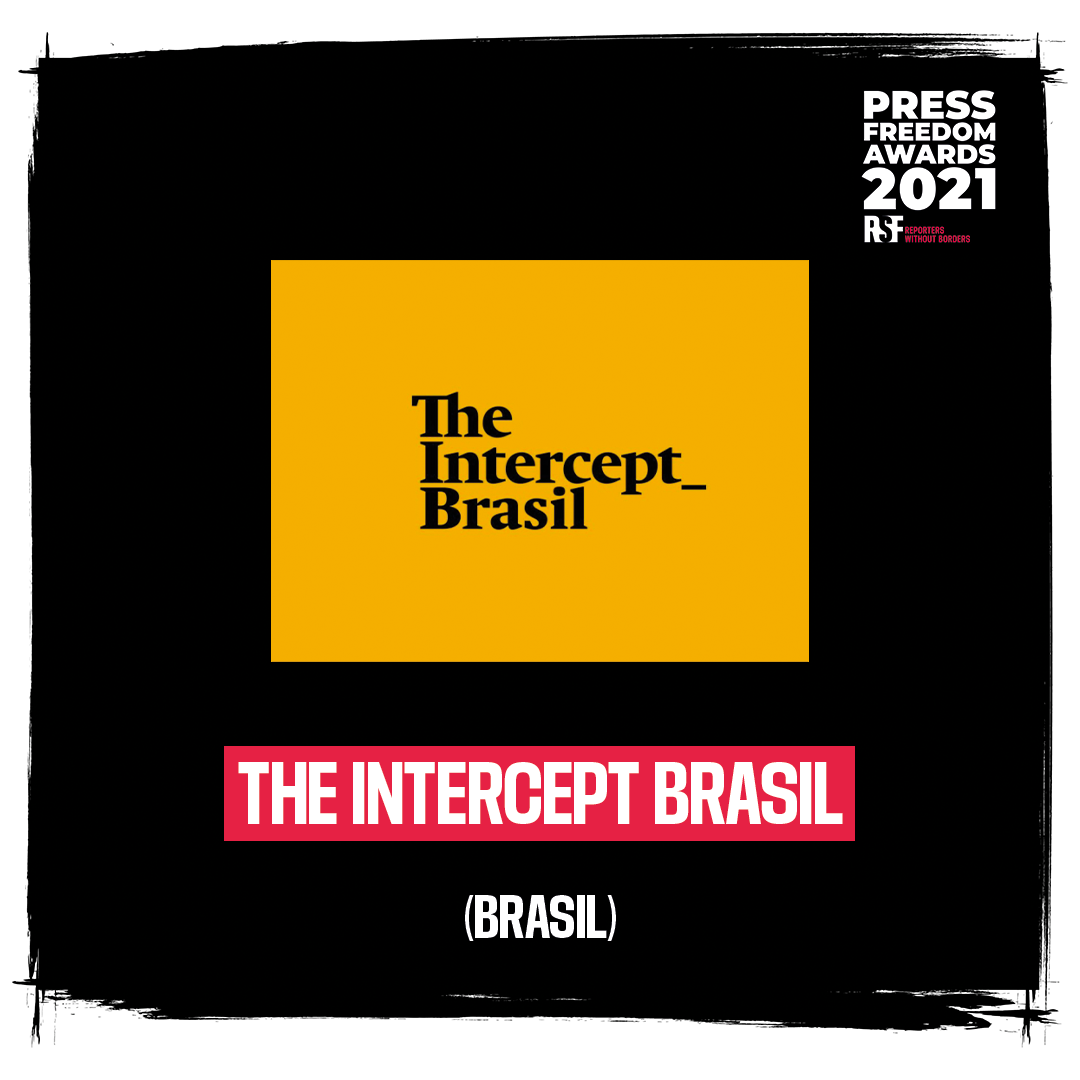
The Intercept Brasil (TIB) investigation on the leaked messages exchanged between prosecutors for Operation Lava Jato (Express wash) -- a corruption scandal involving high placed government officials -- revealed an explicit disregard for Brazilian law, as they proved the judge's bias and his involvement with the prosecution. The TIB team of journalists was threatened, harassed and even had to respond to judicial inquiries. Glenn Greenwald, then director from the TIB, received death threats. But the news website continued with the publications, which in the end brought to light the abuses practiced by the Lava Jato prosecutors. In April 2021, the Supreme Court of Brazil overturned the convictions of former President Lula, considering Judge Sergio Moro as partial in his judgment. The messages that revealed the illegal practice within the Brazilian courts to convict several defendants were decisive for this outcome of the case.
Nominees for the Independence Prize:
Stand News (Hong Kong)

Founded in Hong Kong in December 2014, Stand News is an independent, non-profit, Cantonese-Chinese news website that undertakes to defend fundamental Hong Kong values – “democracy, human rights, freedom, rule of law and justice” – and aims to be a space where journalists are “independent of companies, shareholders, authorities and political parties.” After Apple Daily’s forced closure in June 2021, six of the website’s directors resigned to avoid being prosecuted in turn and all Stand News opinion pieces and columns were taken off line to protect their authors. Today, Stand News continues to cover crucial political and social developments in the territory, and to provide in-depth coverage of government policy and all trials related to the National Security Law
Majdoleen Hassona (Palestine)
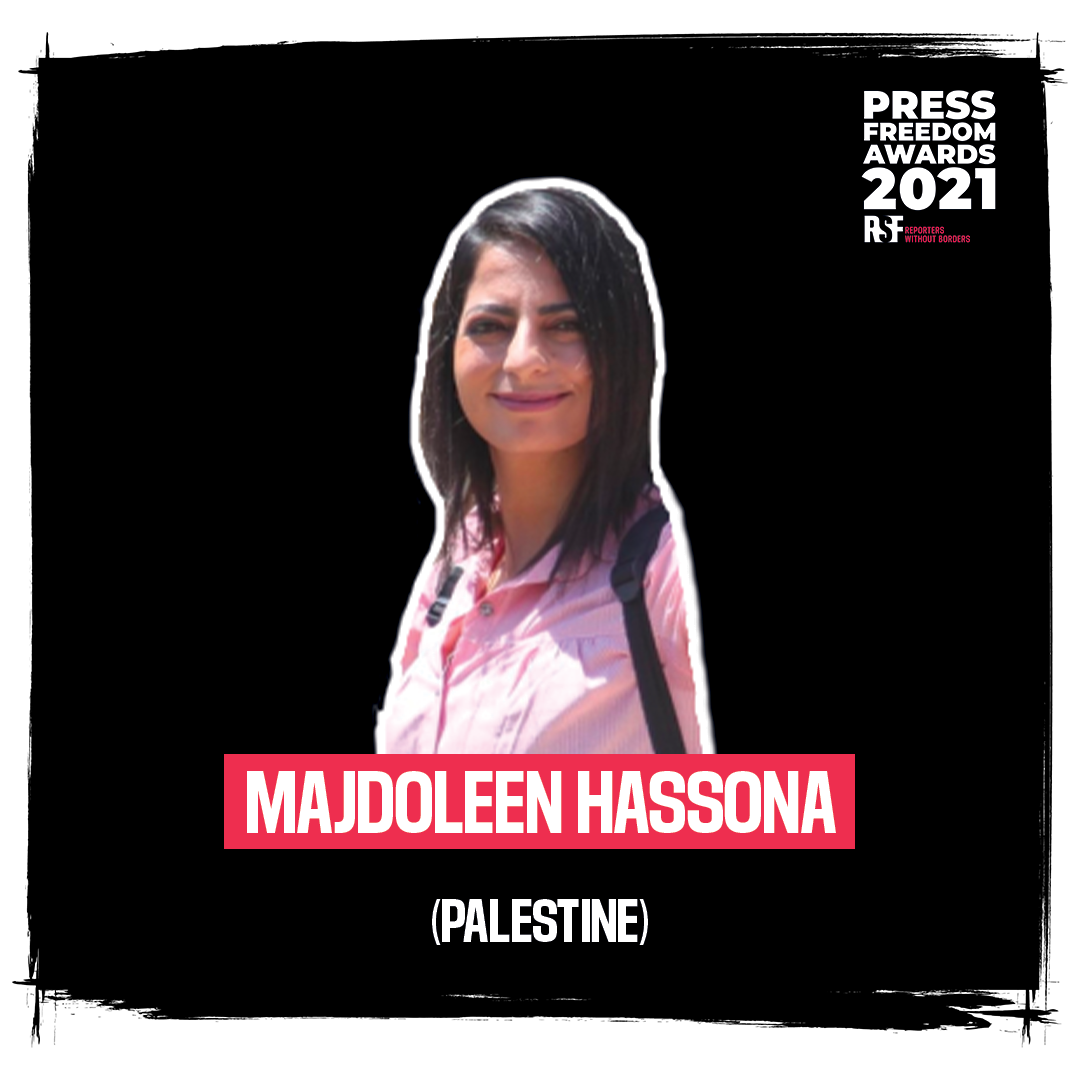
Before joining the Turkish TV channel TRT and relocating to Istanbul, this Palestinian journalist was often harassed and prosecuted by both Israeli and Palestinian authorities for her critical reporting. While on a return visit to the West Bank in August 2019 with her fiancé (also a TRT journalist based in Turkey), she was stopped at an Israeli checkpoint and was told that she was subject to a ban on leaving the territory issued by Israeli intelligence “for security reasons.”
Since then, she has been stranded in the West Bank and separated from her fiancé, who had to return to Turkey without her. She decided to resume reporting in the West Bank and, while covering anti-government protests in June 2021 following the death of the activist Nizar Banat, she was one of two women journalists who were assaulted and beaten by Palestinian security officers
Moussa Aksar (Niger)
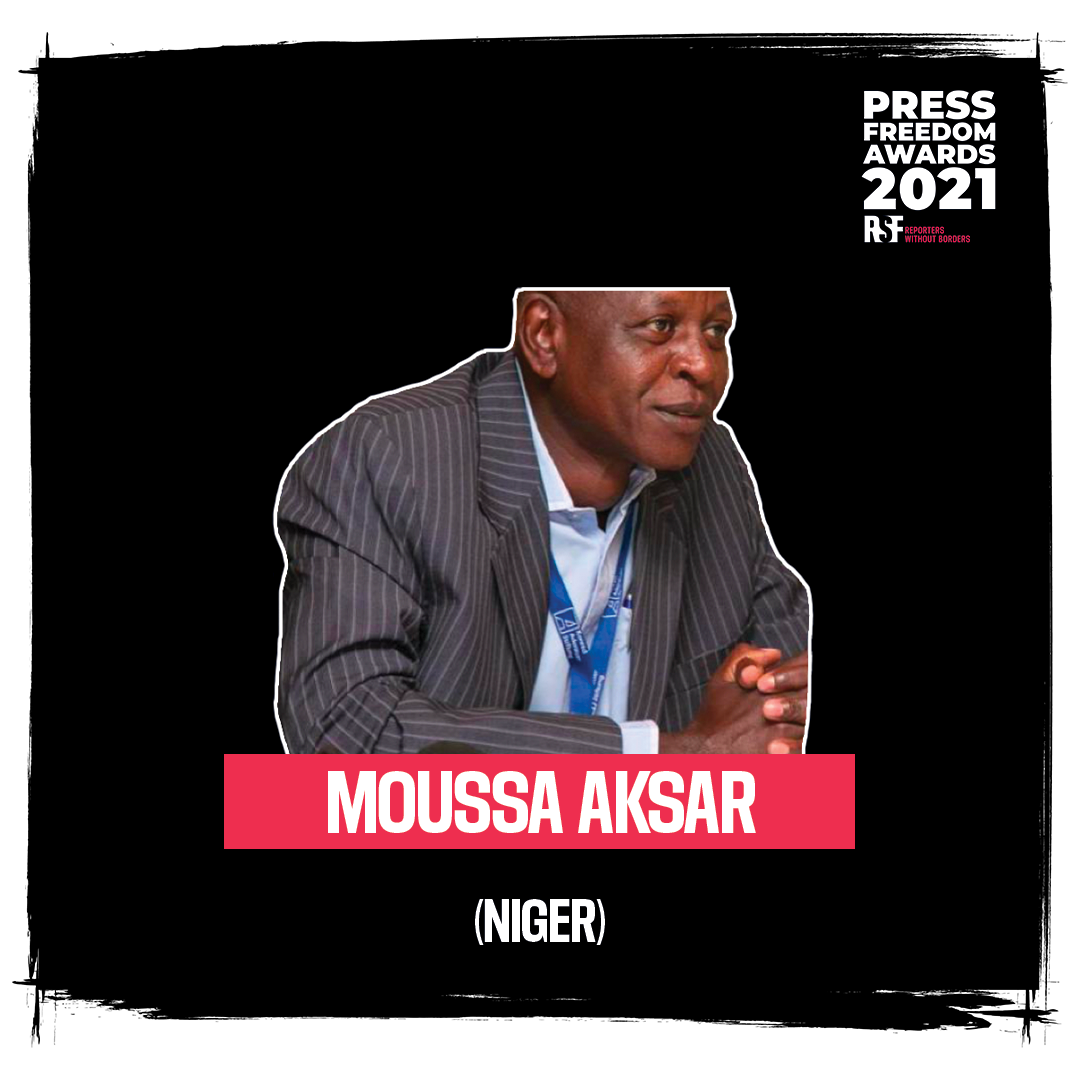
In Niger, a journalist cannot make a living from a publication that specialises in investigative reporting. The level of harassment is too great and advertisers are scared off. To ensure the survival and independence of L’Événement, the newspaper he founded in 2002, Moussa Aksar also runs a farm. Selling mangoes and camel’s milk allows him to continue his work as a journalist. At the same time, he also heads the Norbert Zongo Centre for Investigative Journalism (CENOZO). He stopped publishing a print edition of L’Événement three years ago but the website is holding on and continues to report the news and to investigate despite threats. He has appeared in court eight times in the past two years alone and was fined 1,830 euros in June for participating in an international journalistic investigation that exposed the embezzlement of large sums of public money in connection with arms purchases.
Andras Arato (Hungary)
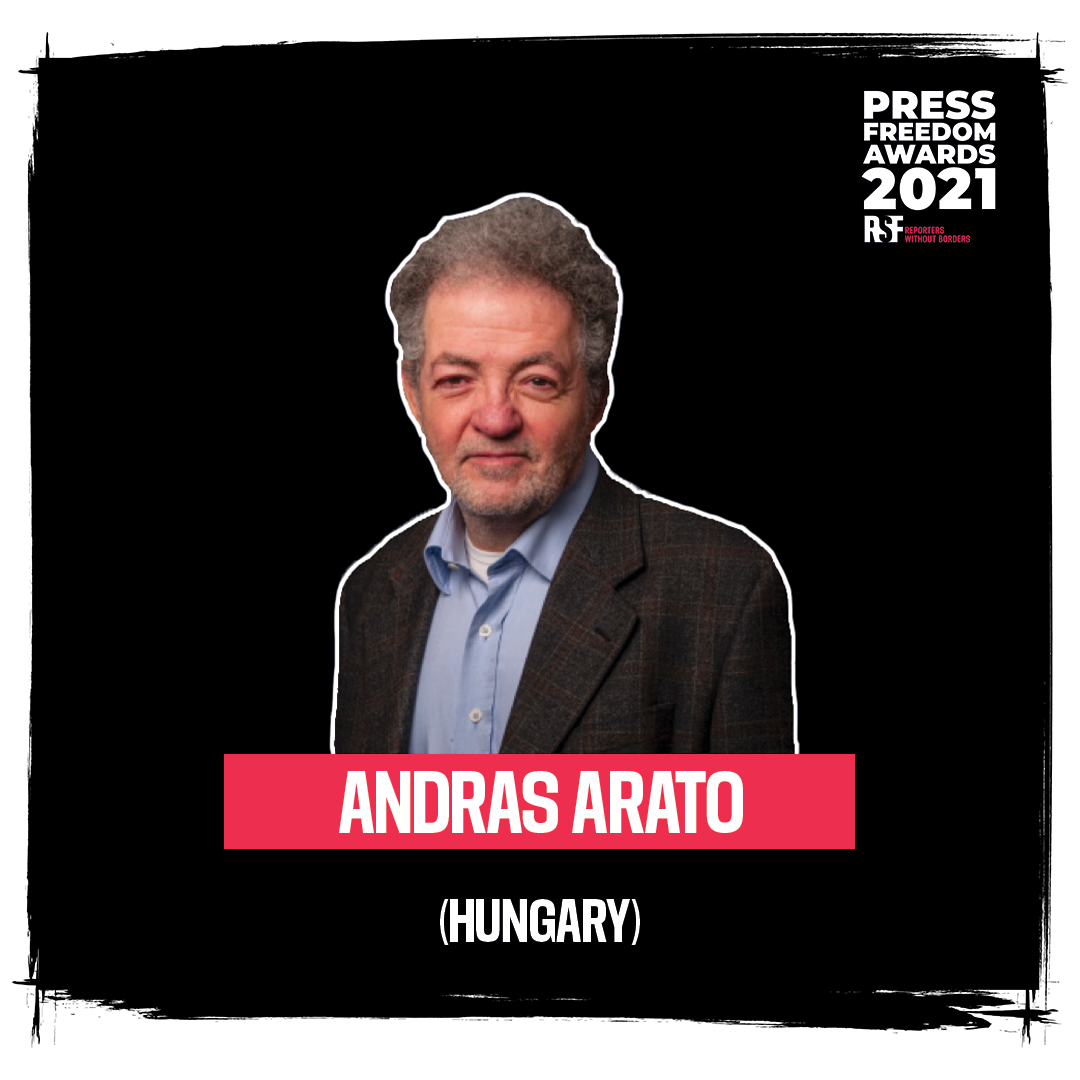
This journalist runs Klubradio, a Budapest-based independent radio station renowned for its outspoken and humorous criticism of the authorities. It became another victim of the Hungarian government's censorship policies when the Hungarian Media Council suspended its operating licence on trivial administrative grounds, in a decision that was deemed discriminatory by the European Commission but was confirmed by Hungary’s Supreme Court. Today, Klubradio only broadcasts on the Internet and survives thanks to the donations of its listeners. And Andras Arato continues to lead the legal and financial battle for what is one of the last major independent news sources in Hungary.
